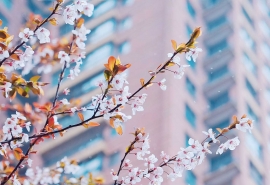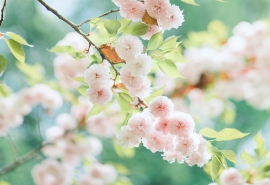
清明节用英语怎么说?
Tomb Sweeping Day.
1、读音:英 [tuːm ˈswiːpɪŋ deɪ],美 [tuːm ˈswiːpɪŋ deɪ]。
2、例句:
Days before Tomb Sweeping Day, this cemetery in northeastern Jilin Province sees a drastic increase of visitors.
清明节前几天,吉林省东北部一个墓地,扫墓的人急剧上升。
Tomb Sweeping Day is our country traditional festival, is also offer sacrifices to festival most importantly, is the day which worships ancestors and visits grave.
清明节是我国传统节日,也是最重要的祭祀节日,是祭祖和扫墓的日子。
Prior to the&搜趣网nbsp;advent of this Tomb Sweeping Day, he thinks of his late daddy and the unforgettable past.
这年清明节前,他又想起了自己的父亲,也想起了这段不同寻常的往事。
China has listed traditional Tomb Sweeping Day, Dragon Boat Festival and Mid-Autumn Festival as legal holidays, which brings more paid leaves to the public, and is conducive to awaken the public awareness of traditional festivals.
近年来,国家将清明、端午、中秋等传统节日列为法定节假日,在给公众更多休假福利的同时,一些专家也认为,此举有利于唤醒公众对传统节日的认识。
The 22-year-old never thought of going to so many places when he completed his first trip to Yangzhou during the Tomb Sweeping Day holiday in his freshman year.
22岁的唐人立在大一学期那个清明节假期首次踏上旅程,前往扬州。那时的他从未想到自己会游历如此多的地方。
Certain folk customs on the Dragon Boat Festival, Tomb Sweeping Day, and other traditional festivals have gradually disappeared.
原本产生于民间的端午节、清明节等传统节日,一些节俗也已不再见于民间。
Water burials also help prevent traffic jams during Tomb Sweeping Day, the traditional festival for visiting the dead, he added.
他补充说,海葬还有助于避免在祭拜先人的传统节日清明节(Tome Sweeping Day)时的交通拥堵。
关于清明节的英语作文
10~16句,不要有太多生词,要突出节日气氛(如:扫墓、献花等等)。要在初中生水平范围之内。急急急~清明节(Qingming Festival)英语作文 精彩句子抢先看
1、But the Qingming Festival is not only a seasonal poi nt to guide farm work, it is more a festival of commemorati on.
清明节不仅是扫墓的日子,还是让我们共同怀念过去的日子。
2、 In the past, the Qingming Festival was called "Arbo r Day". But since 1979, "Arbor Day" was settled as March 12 according to the Gregorian calendar.
过去,清明节称为“植树节”。但是从 1979 年开始,植树节定 为 3 月 12 日。
The Qingming (Pure Brightness) Festival is one of the 2 4 seasonal division points in China, falling on April 4-6 e ach year. After the festival, the temperature will rise up and rainfall increases. It is the high time for spring plow ing and sowing. But the Qingming Festival is not only a sea sonal point to guide farm work, it is more a festival of co mmemoration.
The Qingming Festival sees a combination of sadness and happiness.
This is the most important day of sacrifice. Both the H an and minority ethnic groups at this time offer sacrifices to their ancestors and sweep the tombs of the diseased. Al so, they will not cook on this day and only cold food is se rved.
The Hanshi (Cold Food) Festival was usually one day bef ore the Qingming Festival. As our ancestors often extended the day to the Qingming, they were later combined.
On each Qingming Festival, all cemeteries are crowded w ith people who came to sweep tombs and offer sacrifices. Tr affic on the way to the cemeteries becomes extremely jammed. The customs have been greatly simplified today. After slig htly sweeping the tombs, people offer food, flowers and fav orites of the dead, then burn incense and paper money and b ow before the memorial tablet.
In contrast to the sadness of the tomb sweepers, people also enjoy hope of Spring on this day. The Qingming Festiv al is a time when the sun shines brightly, the trees and gr ass become green and nature is again lively. Since ancient times, people have followed the custom of Spring outings. A t this time tourists are everywhere.
People love to fly kites during the Qingming Festival. Kite flying is actually not limited to the Qingming Festiva l. Its uniqueness lies in that people fly kites not during the day, but also at night. A string of little lanterns tie
d onto the kite or the thread look like shining stars, and therefore, are called "god's lanterns."
The Qingming Festival is also a time to plant trees, fo r the survival rate of saplings is high and trees grow fast later. In the past, the Qingming Festival was called "Arbo r Day". But since 1979, "Arbor Day" was settled as March 12 according to the Gregoria//www.souquanme.comn calendar.
1、Its Chinese name "Qing Ming" literally means "Clear Brig htness," hinting at its importance as a celebration of Spri ng. Similar to the spring festivals of other cultures, Tomb Sweeping Day celebrates the rebirth of nature, while marki ng the beginning of the planting season and other outdoor a ctivities.
清明节,又叫踏青节,正是春光明媚草木吐绿的时节,也正是 人们春游的好时候,所以古人有清明踏青,并开展一系列体育活动
的的习俗。直到今天,清明节祭拜祖先,悼念已逝的亲人的习俗仍 很盛行。
2、In ancient times, people celebrated Qing Ming Jie wi th dancing, singing, picnics, and kite flying. Colored boil ed eggs would be broken to symbolize the opening of life.
3、One theory is that since any number of ghosts rome a round a grave area, the less appealing food will be consume d by the ancestors, and not be plundered by strangers.
每年的公历四月五日前后为清明节,是二十四节气之一。今年 的清明节是 4 月 4 日。在二十四个节气中,既是节气又是节日的只 有清明。清明节是我国传统节日,也是最重要的祭祀节日。按照旧 的习俗,祭祀(扫墓)时,人们要携带酒食果品、纸钱等物品到墓 地,将食物供祭在亲人墓前,再将纸钱焚化,为坟墓培上新土,折 几枝嫩绿的新枝插在坟上,然后叩头行礼祭拜,最后吃掉酒食回 家。
清明节,又叫踏青节,正是春光明媚草木吐绿的时节,也正是 人们春游的好时候,所以古人有清明踏青,并开展一系列体育活动
的的习俗。直到今天,清明节祭拜祖先,悼念已逝的亲人的习俗仍 很盛行。
Celebrated two weeks after the vernal equinox, Tomb Swe eping Day is one of the few traditional Chinese holidays th at follows the solar calendar-- typically falling on April 4, 5, or 6.
Its Chinese name "Qing Ming" literally means "Clear Bri ghtness," hinting at its importance as a celebration of Spr ing. Similar to the spring festivals of other cultures, Tom b Sweeping Day celebrates the rebirth of nature, while mark ing the beginning of the planting season and other outdoor activities.
Qing Ming Jiein Ancient Times
An old man takeswww.souquanme.com one last look before leaving the City Cemetery at Biandanshan of Wuhan, Central China's Hubei Pro vince.In ancient times, people celebrated Qing Ming Jie wit h dancing, singing, picnics, and kite flying. Colored boile d eggs would be broken to symbolize the opening of life. In
the capital, the Emperor would plant trees on the palace g rounds to celebrate the renewing nature of spring. In the v illages, young men and women would court each other.
The Tomb Sweeping Day as Celebrated Today
With the passing of time, this celebration of life beca me a day to the honor past ancestors. Following folk religi on, the Chinese believed that the spirits of deceased ances tors looked after the family. Sacrifices of food and spirit money could keep them happy, and the family would prosper through good harvests and more children.
Today, Chinese visit their family graves to tend to any underbrush that has grown. Weeds are pulled, and dirt swep t away, and the family will set out offerings of food and s pirit money. Unlike the sacrifices at a family's home altar, the offerings at the tomb usually consist of dry, bland fo od. One theory is that since any number of ghosts rome arou nd a grave area, the less appealing food will be consumed b y the ancestors, and not be plundered by strangers.
Honoring Ancestors
Honoring ancestors begins with proper positioning of a gravesite and coffin. Experts in feng shui, or geomancy, de termine the quality of land by the surrounding www.souquanme.comaspects of s treams, rivers, trees, hills, and so forth. An area that fa ces south, with groves of pine trees creates the best flow of cosmic energy required to keep ancestors happy. Unfortun ately, nowadays, with ChFGRQHNyHxTina's burgeoning population, public cemetaries have quickly surplanted private gravesites. Fam ily elders will visit the gravesite at least once a year to tend to the tombs.
While bland food is placed by the tombs on Qing Ming Ji e, the Chinese regularly provide scrumptious offerings to t heir ancestors at altar tables in their homes. The food usu ally consists of chicken, eggs, or other dishes a deceased ancestor was fond of. Accompanied by rice, the dishes and e ating utensils are carefully arranged so as to bring good l uck. Sometimes, a family will put burning incense with the
offering so as to expedite the transfer of nutritious eleme nts to the ancestors. In some parts of China, the food is t hen eaten by the entire family.
关于清明的英语句子
Qingming
Festival,
our
family
to
the
grave
清明节,我们一家来扫墓
The
occasion,
please
let
me
die
for
you
family
presented
a
bunch
of
flowers,
to
show
respect!
清明之际,请容我也为你逝去的亲人献上鲜花一束,以示敬意
清明节英语作文带翻译60字
清明节英语作文带翻译60字Qing Ming is a time to remember the dead and the dearly departed.More important,it is a period to honour and to pay respect to one's deceased ancestors and family members.Because it reinforces the ethic of filial piety,Qing Ming is a major Chinese festival.
Literally meaning "clear" (Qing) and "bright" (Ming),this Chinese festival falls in early spring,on the 106th day after the winter solstice.It is a "spring" festival,and it is an occasion for the whole family to leave the home and to sweep the graves of their forebears.Chinese being practical people this sweeping of the graves is given an extended period,that is,10 days before and after Qing Ming day.Among some dialect groups a whole month is allocated.
清明节是一个纪念祖先的节日.主要的纪念仪式是扫墓,扫墓是慎终追远、郭亲睦邻及行孝的具体表现;基于上述意义,清明节因此成为华人的重要节日.清明节是在仲春和暮春之交,也就是冬至后的106天.扫墓活动通常是在清明节的前十天或后十天.有些地域的人士的扫墓活动长达一个月.
清明节的英语作文 有汉语意思
简单一点 80字左右Ming
Jie(All
Souls'
Day)
Qing
Ming
is
a
time
to
remember
the
dead
and
the
dearly
departed.
More
important,
it
is
a
period
to
honour
and
to
pay
respect
to
one's
deceased
ancestors
and
family
members.
Because
it
reinforces
the
ethic
of
filial
piety,
Qing
Ming
is
a
major
Chinese
festival.
Literally
meaning
"clear"
(Qing)
and
"bright"
(Ming),
this
Chinese
festival
falls
in
early
spring,
on
the
106th
day
after
the
winter
solstice.
It
is
a
"spring"
festival,
and
it
is
an
occasion
for
the
whole
family
to
leave
the
home
and
to
sweep
the
graves
of
their
forebears.
Chinese
being
practical
people
this
sweeping
of
the
graves
is
given
an
extended
period,
that
is,
10
days
before
and
after
Qing
Ming
day.
Among
some
dialect
groups
a
whole
month
is
allocated.
清明节是一个纪念祖先的节日。主要的纪念仪式是扫墓,扫墓是慎终追远、郭亲睦邻及行孝的具体表现;基于上述意义,清明节因此成为华人的重要节日。
清明节是在仲春和暮春之交,也就是冬至后的106天。扫墓活动通常是在清明节的前十天或后十天。有些地域的人士的扫墓活动长达一个月。





